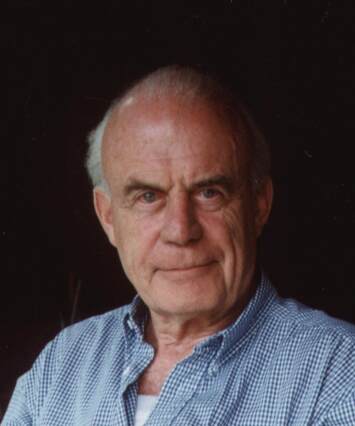By EINAR ENGEBRETSEN
It was a sharp late autumn evening in Kiruna, north Sweden. I had a long day behind me, and a tedious journey ahead. But there was time for a warm meal at the station café before the train left.
There were two other customers in the café: one hidden behind the local newspaper, and the other sleeping sweetly. The only sound which broke the silence was when the newspaper reader, after sucking all the nourishment out of one page, turned over to the next, like a large bumble bee.
My fork was on its way into my steaming food, when the door burst open. A man stood in the doorway, blinking in the glaring light. He grinned - as if to defend himself against others' contempt or his own. He was far from sober. Gingerly he put one foot forward, as if to test thin ice. Finding that it was safe, he steered towards my table, with the measured steps of an experienced alcoholic. He sat down at the table next to me and ordered a beer.
I tried to concentrate on my meal and my glass of water, but he riveted my attention. My small feeling of well-being was punctured: his presence filled me with a cold gust of aversion. But before this had got full control I was overwhelmed with feelings of guilt. There I sat, condemning a person I did not know. I suddenly saw that I was addicted to self-righteousness, a drink which breaks more people than alcohol.
Perhaps, I felt, I was the greater sinner here? There is a long distance between contempt and understanding, from loathing to compassion.
Meanwhile my neighbour emptied his glass, got up restlessly and, on his way out, knocked against my table. I laid down my knife and fork and said, 'Have a good evening.' He went out.
Once again we were just three in the room.
Then slowly the door opened a little. In the crack, the bloated face could be seen. After a moment's thought, he walked towards me and asked pressingly if I would come outside.
Instinctively, I looked to see if he had a knife in his hand. Then I got up and followed him out. As the door closed behind us, he took a firm but cautious grip on my jacket so as to keep his balance - or, just as likely, to make sure I didn't leave.
THE REAL MIRACLE
He made a couple of attempts to say something and then out it came: 'You probably think I am a hopeless person?' Had he asked me that 12 minutes earlier, I would have had to lie to contradict him. But now I could say wholeheartedly,
'There is greater hope for you than for me, and I reckon that there is still hope for me.'
He asked me to repeat what I had said. I did. He let go of me and began to cry. 'I have a wife and two small girls at home...' and he named a town in south Sweden. It was a long time since he had been there. His travel money kept being drunk up.
'Do you think there is a God?' he whispered. I answered, 'Yes.' He struggled to gather his thoughts. 'When I was a child....' He broke off, and the conversation was over. He looked me in the eyes to establish that I meant what I had said, and then he went. I went back to my coffee, which was now lukewarm.
Just before the train left, an electrician from the Kiruna mines came to see me off. I mentioned my encounter. 'Oh him,' he said, 'he's one of the town's best joiners. He's worked here for years, but no one has ever seen him sober.'
A couple of weeks later, when I was back in the south, a letter came from my electrician friend. He had met the 'drunken' joiner - in church. The joiner was sober, he looked different and had not touched a drop of alcohol since that evening at the station. 'He was a walking miracle,' was the final sentence in the letter.
That was a strong statement, I thought. And perhaps it was not so remarkable that a drunk should be freed from alcohol dependence.
The real miracle had taken place in the self-righteous water-drinker who had seen himself as he really was.
Translated from Einar Engebretsen's new book, Det moralske absolutt (The moral absolute), Agave kunst- og bokforlag, Sande, 2002. A cartoon by Einar Engebretsen can be seen on page two of each issue of FAC.


